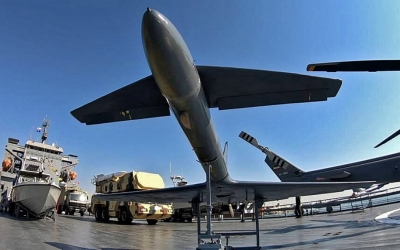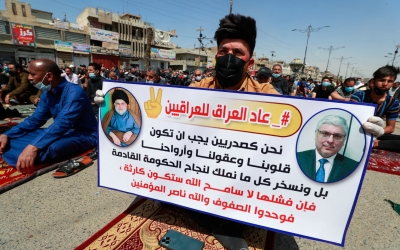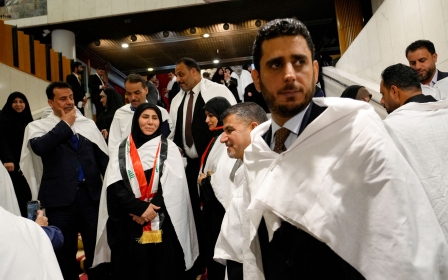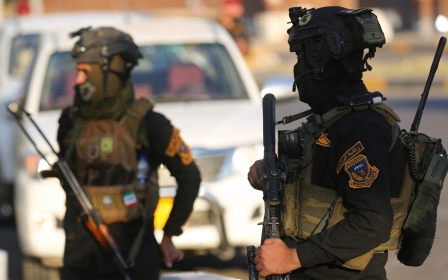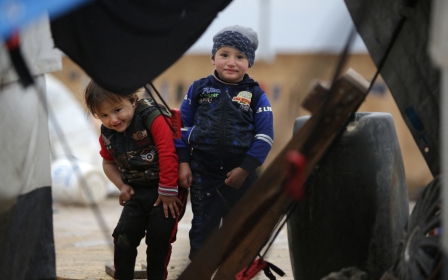Iraq's Sadr bets on Ramadan and shifting Kurdish positions to save his project
On the eve of Wednesday's presidential election session, reaching quorum remains a major obstacle to Iraq's Muqtada al-Sadr and his tripartite parliamentary alliance.
Negotiators and political leaders told Middle East Eye on Tuesday that the influential Shia cleric and his political allies are struggling to find a way through the obstacles placed by their rivals and form a majority government that will sideline major Iran-backed forces.
The struggle between the two major competing coalitions - "Save the Homeland" led by Sadr, and the "Coordination Framework" headed by former Iraqi Prime Minister Nuri al-Maliki - over who will form the government reached its climax in recent days.
Sadr needs two-thirds of Iraq’s 329 MPs to appear in Wednesday’s parliament session to secure quorum that will allow a new president to be elected and a prime minister to be nominated, following October’s parliamentary elections.
'Parliament sessions will stop throughout the month of Ramadan and this will provide an opportunity for all parties'
- Save the Homeland negotiator
But Maliki and his allies have so far ensured the boycott of at least 110 MPs, creating a “blocking third” to avoid being marginalised by Sadr’s political project.
New MEE newsletter: Jerusalem Dispatch
Sign up to get the latest insights and analysis on Israel-Palestine, alongside Turkey Unpacked and other MEE newsletters
Over the past two weeks, both sides have worked to convince independent MPs and small parliamentary blocs – including those that emerged from the 2019 anti-government protest movement – to either attend parliament or not.
Various legal and illegal tools of persuasion, including bribery, promises of government positions, and threats of exclusion and murder, have been used by the rivals to pressure MPs into doing as they require, sources told MEE.
A session to elect a president was attempted on Saturday, but Sadr’s coalition was unable to convince more than 202 of the 220 MPs needed to reach quorum to attend.
Sources from both rival camps told MEE that it is clear Sadr and his allies have not succeeded in convincing the rest of the MPs they need in time for Wednesday’s attempted session.
Negotiators from Sadr and Maliki’s alliances told MEE that Wednesday's session will likely be postponed and that the holy month of Ramadan, which begins next week, will be an appropriate opportunity for further negotiations.
"The blockage still exists. Nothing has really changed. The probability of holding the session is very low," a Save the Homeland negotiator told MEE.
“We do not think that the quorum will be achieved in tomorrow's session and that it will be postponed again. In any case, parliament sessions will stop throughout the month of Ramadan and this will provide an opportunity for all parties to negotiate and resolve matters.”
Kurdish bottleneck
The Save the Homeland coalition consists of the Sadrist Sairoon bloc, the biggest winner in the October national parliamentary elections; most Sunni blocs, led by Parliament Speaker Muhammad al-Halbousi; and a number of Kurdish blocs, led by Massoud Barzani, the former Kurdistan region president.
Although together they have around 190 MPs – enough to vote in a president and government – the alliance needs the support of at least 30 MPs from other blocs or independents to achieve the required quorum. Constitutionally, a president must be elected before a prime minister is designated and assigned to form a government.
The dispute between Sadr and Maliki’s projects revolves around who has the largest bloc and therefore the constitutional right to name the choice of prime minister.
Sadr, whose bloc won 74 seats, more than double the number of seats obtained by his closest Shia rival Maliki, is seeking to form what he calls a “national majority government”. Iraq’s largest parties have traditionally shared power, but Sadr seeks a government excluding Maliki and other forces close to Iran, suggesting they act as opposition and hold his cabinet to account.
But Iranian-backed forces such as the Patriotic Union of Kurdistan (PUK) and Shia armed factions, which suffered severe losses in the elections, see the Sadr project as a major threat to their interests and an attempt to exclude and eliminate them, political leaders said.
According to the sectarian and ethnic power-sharing system adopted by the Iraqi political forces since 2005, a Kurd always takes the position of the president, a Sunni holds the office of speaker, and prime ministers are nominated from the Shia community – as it is the largest demographic.
Most Sunnis decided to team up with Halbousi within Sadr’s project and renominated him as speaker in early January.
However, the Kurds are split into three main groups: Barzani’s Kurdistan Democratic Party (KDP), outgoing president Barham Salih’s PUK, and the oppositional New Generation Movement, led by Shaswar Abdul Wahid.
Their opposition to each other’s projects has created a political bottleneck.
"To tell the truth, the Kurdish political forces are the reason for the current blockage. The political suffocation is at its highest levels, and everyone is insisting on stubbornness and refusing to compromise with the other," a senior PUK leader close to Salih told MEE.
"We do not expect any breakthrough soon. The situation is very complicated and difficult to get out of, and the leaders of both parties [the KDP and the PUK] refuse to listen to any proposed settlement."
'To tell the truth, the Kurdish political forces are the reason for the current blockage. The political suffocation is at its highest levels'
- Senior PUK leader close to Salih
Since 1991, the KDP and PUK have shared rule in the semi-autonomous Kurdistan region and have had an understanding whereupon the latter takes the federal presidency while the former holds the office of Kurdistan’s president.
But when the PUK aligned with the Baghdad government in 2017, and the KDP sought Kurdish independence via a controversial referendum, seeds of future conflict between the two parties were sown.
Kurdish political leaders told MEE that the KDP saw the PUK move as a betrayal that annulled their power-sharing agreement, and now the party seeks the federal presidency so prized by its rival.
"The real problem is that the KDP seeks to seize all positions in the [Kurdistan] region and outside, to end its opponent," a prominent Kurdish political leader told MEE.
"The matter has gone beyond the stage of revenge against the PUK. The KDP knows that by stripping the PUK of the position of the federal president, it will be ended and its audience will be scattered.
"The goal is to deal a severe blow to the PUK, and the monopoly of power."
The expected scenarios
Though it has faced severe difficulties, the success of Sadr’s project is still likely, observers say. But it is contingent on him finding the 20 MPs he needs to achieve a quorum sooner rather than later.
Betting on independents who did not respond to Sadr’s call last week does not seem promising. Sources told MEE that they made “unrealistic demands” and had little confidence in Sadr.
So the cleric has had to expand his attempts to include other forces.
The PUK was Sadr's first choice this time, so late on Monday, he phoned Bafel Talabani, head of the Kurdish party’s negotiating team, offering to talk. But negotiators from both alliances told MEE that the call did not result in any change in the current situation.
If the KDP takes a step back and withdraws from the competition for federal president, that would be “sufficient for the PUK to abandon its agreement with the Coordination Framework forces, and win its support for the Sadr project", a leader of Sadr’s coalition told MEE.
"From our point of view, we believe that returning to the old agreement between the two [Kurdish] parties would solve the existing problem,” he said.
“Sadr did not previously interfere in the negotiations between the two parties, now he personally jumped to involve himself. Let's see what will happen."
The second scenario, which is likeliest to happen soon, is announcing the postponement of government formation attempts until Ramadan ends in early May.
"This is a long time that will enable many forces to change their positions, negatively or positively," one of Sadr’s negotiators told MEE.
Sadr's opponents are not expected to oppose this delay, as they are also betting that Sadr or a number of his allies will change their positions and soften the stance on a majority government.
The third scenario is that Sadr announces his failure - as he promised he would if unsuccessful - and abandons his project to return to negotiations with his opponents to form a consensual government in which everyone participates. He could also announce his withdrawal and go into opposition.
But Sadr backing down seems unlikely any time soon.
"Everyone seems exhausted, and the atmosphere is tense and may reflect on the security situation at any moment. So the delay now seems to be a magic solution to calm the situation," a senior KDP leader close to Barazani told MEE.
"I don't think there is a legal problem with the postponement. All the litigants want the postponement in the hope that the solution will come to them from the sky... No one will object to the postponement option."
Middle East Eye delivers independent and unrivalled coverage and analysis of the Middle East, North Africa and beyond. To learn more about republishing this content and the associated fees, please fill out this form. More about MEE can be found here.


